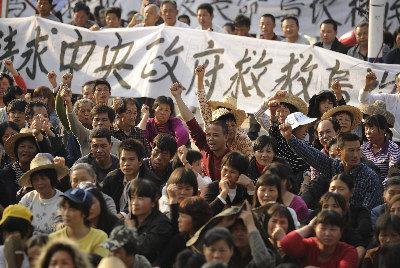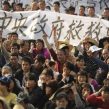
Wukan Uprising Highlights Dilemmas of Preserving Stability
Publication: China Brief Volume: 11 Issue: 23
By:

Since September, the residents of the Guangdong village Wukan have clashed with authorities over local government land seizures. Last week, however, Xue Jinbo, a village representative trying to negotiate with local officials, died in police custody with reportedly visible signs of torture, such as blood on his lips and broken fingers. The death led the Wukan villagers to throw out the last remaining officials, marking a state of rebellion. Villagers however deny they are rebelling, stating they only want their land returned to them and recognition of the legitimacy of their self-selected village committee (Reuters, December 20; Ming Pao, December 19). The continuing standoff and decisions on how to resolve the situation facing authorities highlight some of the major concerns and contradictions in how Beijing preserves stability.
The immediate causes of the Wukan incident appear to be related to official corruption in the form of government land grabs for developers. Local budget shortfalls have encouraged local officials—who are rated on their contributions to GDP growth—to under-compensate peasants for appropriated land, which is then used by developers for major projects that can be taxed at higher rates. In this case, the local government pocketed $110 million while reimbursing each villager $87 for a total of only a few hundred thousand dollars (Caixin, November 22). As Chinese real estate prices have fallen because of Beijing’s efforts to cool the economy, local governments have earned less on each land sale and development project, creating local budget shortfalls. Where central authority is weak, the incentive is to push local state-owned developers to continue, if not accelerate, their purchases of land appropriated by the government with ever-lower compensation for the peasants (Caixin, December 19; The Telegraph, December 15; “Local Debt Problems Highlight Weak Links in China’s Economic Model,” China Brief, July 15). Given these pressures, it is almost a wonder no other such long-lasting demonstrations have appeared.
The government has responded by sealing off the village with People’s Armed Police and shutting off electricity, food and water supplies, which local officials are denying. One official stated “villagers can come and go freely.” Another spokesman claimed this state of affairs was “non-existent” and said he felt quite helpless in the face of so many unhelpful rumors (Wen Wei Po, December 20; Ming Pao, December 19, December 13; The Telegraph, December 12). As if the reported siege was insufficient, Chinese netizens now are circulating rumors the People’s Liberation Army (PLA) units may be moving in around the village (Ming Pao, December 19).
As expected, state-run Chinese media has provided little in the way of coverage in the last few months, suggesting the difficulty state propagandists have in spinning the growing number of social protests. China’s second largest wire service reported the “reasonable demands of the villagers” would be met and the corrupt officials would face an investigation from the Discipline Inspection Committee (China News Service, December 14). In a separate article, the wire service claimed Xue’s family members concurred with medical examiners that “sudden cardiac failure,” not police brutality, accounted for his death (China News Service, December 14). These articles have formed the basis for most domestic Chinese news articles. The main message is clear: the central government in Beijing serves the people’s interest and will crack down on the malfeasance of local officials when their corruption goes too far.
Looking forward, the Wukan situation raises several key issues and questions that will challenge the Chinese leadership and reverberate well beyond the limits of the village. First, if local police under provincial government control cannot restore order, then Beijing faces a dilemma about choosing to use the People’s Liberation Army (PLA) to pick up where the police failed. Local police can act with impunity without endangering the leadership’s strategy of keeping protestors focused on local grievances, while simultaneously appealing for the national government to provide succor (Li Cheng, “Think National, Blame Local: Central-Provincial Dynamics in the Hu Era,” China Leadership Monitor, January 30, 2006). Indeed, Wukan villagers continue to believe Beijing will support them in dealing with local corruption (Reuters, December 19; Ming Pao, December 16). Letting the PLA violently repress demonstrations however could not be disguised as a local decision and would make the central government directly responsible, ruining Beijing’s long-standing strategy as word of the military crackdown eventually spread.
Second, using the PLA to suppress Wukan village, and potentially others like it, also probably will affect the military’s cherished personnel reform efforts. Smart, motivated people are less likely to join a military seen as an enemy of the people. The PLA’s efforts to build a force capable of fighting and winning under modern, high-tech conditions rely heavily on the success of its efforts to fill the ranks with more educated commissioned and noncommissioned officers. To this end, the PLA—both at an individual service level and at a PLA-wide level—steadily has introduced reforms to its education and training system (“Chinese Air Force Officer Recruitment, Education and Training,” China Brief, November 30; “Noncommissioned Officers and the Creation of a Volunteer Force,” China Brief, September 30). Even though the PLA remains the “Party’s army,” actions that would impact the PLA’s ability to attract and retain higher-caliber personnel could force a choice for Chinese generals between the Party’s immediate interests in stability and the military’s long-term interests in reform. While this choice becomes more pressing if crises begin to cascade and force a wider crackdown, isolated demonstrations also have the potential to create this dilemma if allowed to persist too long.
Finally, the Wukan story shows the difficulty of keeping quiet major stories that receive coverage in external, especially Hong Kong, media outlets. Posts on Sina Weibo—China’s largest Twitter-like microblogging platform—continue to circumvent the censors, at least for a time, so long as Wukan and Xue Jinbo are not mentioned explicitly. Weibo users however have posted screenshots and photos of Hong Kong-based papers, such as the Apple Daily and Ming Pao that have covered the Wukan protests (China Media Project, December 19). While the new requirement to register using true names could frighten some users out of posting such controversial information, an equally possible outcome is that Beijing would have to make mass arrests to control information and to inspire greater self-censorship. Such a result however could fuel anger at Beijing, because of the well-publicized and contradictory central government goals to promote a “healthy Internet environment” and various forms of open government (“Plenum Document Highlights Broad Role for Social Management,” China Brief, October 28).





